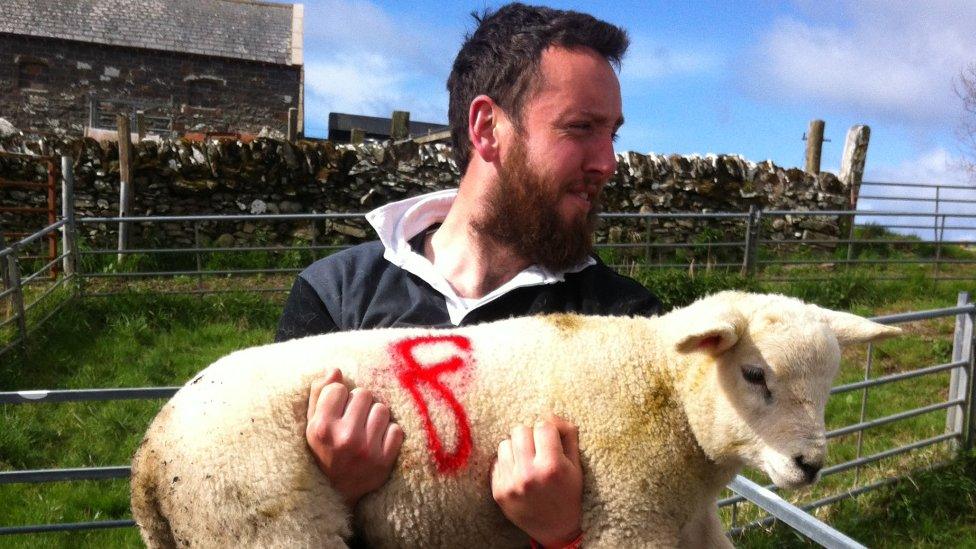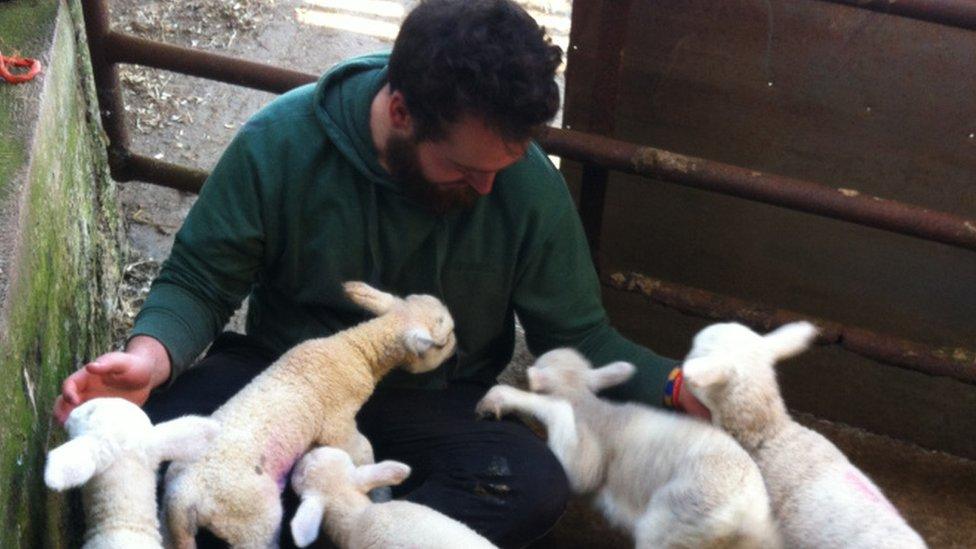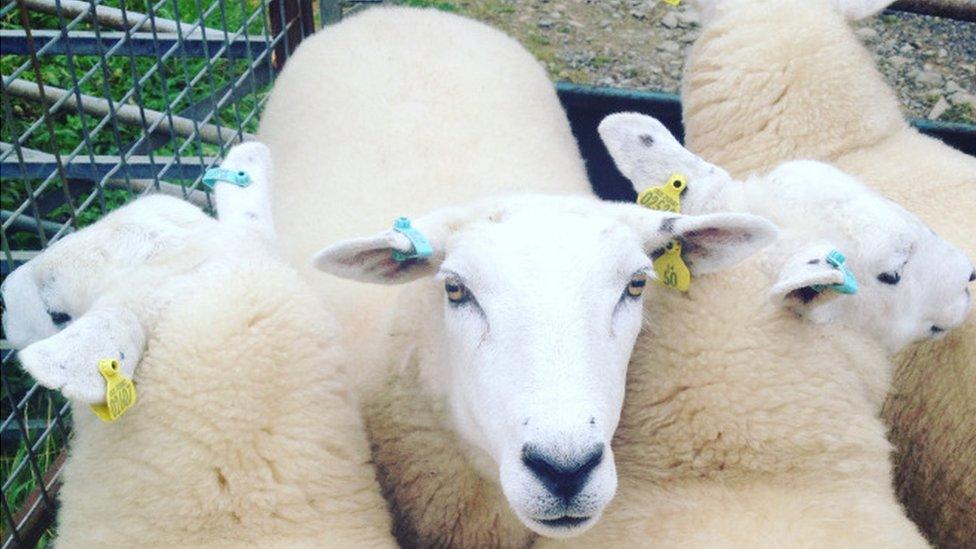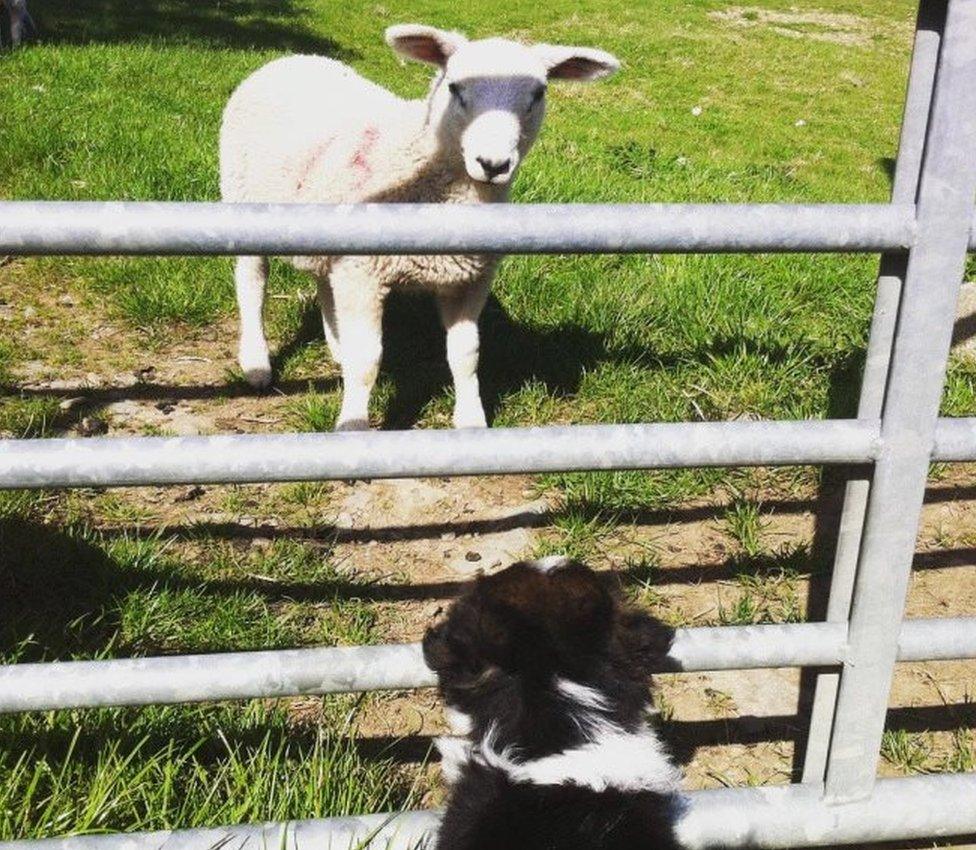How to build a farm from scratch
- Published

Shepherd James Baylis quit his office job to become a farmer in the south-west of Scotland
The prospect of rearing animals, producing food and spending more time in the great outdoors are attractive propositions for office-bound wannabe farmers.
For many it will remain little more than a pipe dream but there are a determined few "new entrants" to the industry who are set on establishing their own successful farming enterprises. How easy is it to build a farm from scratch?
When James Baylis graduated from university in 2013, he quickly found himself a comfortable office job and a steady income.
But within months, he was disillusioned and miserable. He felt he was "wasting his life" in the lengthy daily commute, just to spend the rest of the day sat in front of a computer screen.
So he made a life-changing decision: he swapped the rat race for the great outdoors. Fast forward to 2016 and the 25-year-old says he has no regrets.
In little over a year since moving to rural south-west Scotland, he has bought a small flock of sheep and he is preparing for his second lambing season. In the next few months, he is expecting to lamb 75 ewes which - with luck - should produce 129 lambs.
As a young farmer, he is one of an increasingly rare breed in Scottish agriculture. The latest statistics from the Scottish government, external reveal that just 11% of the country's principal farmers are aged under 41; more than half are older than 55.

He is preparing to lamb 75 ewes this year - his second lambing season
The transition from office to farm was particularly remarkable for the bearded Welshman who, until two years ago, had never even mucked out a shed or sat on a tractor. But after taking on some part-time work at a local farm, any romantic image of agricultural labouring quickly disappeared.
"I'd always thought I'd just end up with a wee smallholding later on but the final decision to actually go for it and try and find a farming job was made while mucking out a cattle shed over Christmas," he said.
"I think it's very easy to have an idyllic view of farming, like something from of the pages of a kid's book, but that image can be so far from the truth."
Farm work can be gruelling, spirit-crushing hard labour in rain, snow, wind and - in Scotland at least - only occasional sunshine. For many even the financial reward is limited.
'Wonderful job'
Mr Baylis has earned nothing from his own flock, which he keeps on his girlfriend's family farm near Borgue in Dumfries and Galloway. He lives on his savings, income from contract shepherding work and some journalism for agricultural publications.
But the newcomer, who has documented his career in a blog, external, remains committed to the industry. After creating content for websites in his previous job, he now he feels he is doing something of tangible value.
"I am creating a product that people need whether or not they accept that all the time," he said. "I am producing food. I am doing something worthwhile.
"On the worst days, it's still a wonderful job, or lifestyle, or way of life. On the worst days, it's so much better than anything else. I can't go back to doing anything other than farming, without being really miserable."
He added: "Even when it's pouring down with rain and the wind's trying the blow the house down, I wouldn't swap it for the world."

Among his flock are five pedigree Lleyns - a breed that hails from Wales

James bought his new sheepdog, Non, from Gareth Wyn Jones, who starred in BBC One's The Hill Farm
It is relatively uncommon for someone without any background in agriculture to establish their own farming enterprise. Established family farms are normally passed from one generation to the next.
New entrants need land and capital to get started - barriers that are simply insurmountable for many budding farmers.
According to Kirsten Williams, the manager for new entrant activities at Scotland's Rural College (SRUC), many young people find it difficult to source capital from lenders and the cash flow pattern of a farming business means cash is tied up for a long time before there is a return on any investment.
"If you purchase a breeding heifer you have to get her in calf, then there is a nine-month pregnancy, then the calf is reared and is often sold at 12 months old," she said.
"This means you have to wait approximately two years to initially potentially pay for your initial investment and then wait a further year for more income from the cow by means of another calf, whilst purchasing inputs through the year for her maintenance - feed, medicines, etc."
It is a problem that has been identified by the Scottish government, however, and a grant of 70,000 Euros (£52,360) is available to new entrants to the industry and young farmers aged between 16 and 41 through the its Scottish Rural Development programme, external.

Sheepdog Non is in training to work with Mr Baylis' flock
There is strict criteria however: new entrants must have at least three hectares of land, and young farmers need at least five years of experience or a relevant qualification.
With the value of agricultural land at an all-time high, Ms Williams said many new entrants can only rent land on a seasonal basis from other farmers, making it difficult for businesses to plan ahead.
There is also a lack of fixed tenancies being offered by landowners, according to Ms Williams but Forestry Commission Scotland has offered 10 small "starter farm units", external to new farmers across the country.
Newcomer Mr Baylis knows he has a "difficult but not impossible" journey to establish himself as farmer. He has been selected as Tesco Future Farmer, external, through which he can receive tailored training and advice and he is hoping to gain experience in dairy farming.
So how does he feel about the decision to give up his office job, his steady income and his flat for a life on the land?
"It was either brave or stupid," he said. "But I'm pleased with how far I have come in the last 18 months and I'm looking forward to the future."